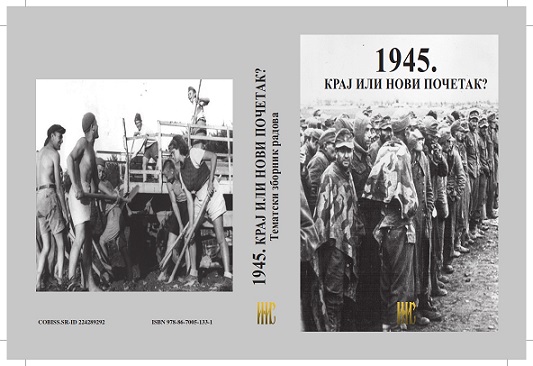Обнова Савеза јеврејских вероисповедних општина Југославиje после Другог светског pata и повратак прве групе јеврејских заробљеника и избеглица у Србију
The Reconstruction of the Union of Jewish Religious Communes in Yugoslavia after WWII and the Return of a Group of Jewish POWs and Refugees to Serbia
Author(s): Mladenka Ivanković
Subject(s): Civil Society, Political history, Social history, Politics and religion, Fascism, Nazism and WW II, History of the Holocaust, History of Antisemitism, Sociology of Politics
Published by: Institut za noviju istoriju Srbije
Keywords: Union of Jewish Religious Communes in Yugoslavia; civil population; Holocaust; refugees; POWs; students; children;
Summary/Abstract: The activity of the Union of Jewish Religious Communes in Yugoslavia (henceforth: the Union) was renewed on October 22, 1944. The Union was reconstructed on the basis of the pre-war organization that went into the same activities and bore the same name. Under the law valid at the moment the Union had been set up, it was treated as a religious community. In keeping with the changed social and political conditions, it was necessary to start the process of adapting to the new reality. The change of status and character of the post-war Jewish community was officially adopted at the sixth post-war conference of the Union of Jewish Communes in September 1952. This was made official by removing the word “religious” from the official name of the Union. After WWII there were some 4,400 Jews who had survived the war as civilians and members of the partisan movement in the whole territory of Yugoslavia. The population that had survived the horrors of the war in the Yugoslav territory was enlarged through arrival of refugees and POWs who had been in camps in occupiers’ or neutral countries. They were registered with the Union. Apart from Yugoslav citizens, among the refugees who contacted the Union there were also citizens of 18 European and non-European countries: of Germany, Switzerland, Turkey, USA, UK, Columbia, Spain, Syria, France and Poland. The Union of Jewish Religious Communes of Yugoslavia organized their lives too and took care of them, as well as of Yugoslav nationals.
Book: 1945. Kpaj или нови почетак?
- Page Range: 229-243
- Page Count: 15
- Publication Year: 2016
- Language: Serbian
- Content File-PDF

